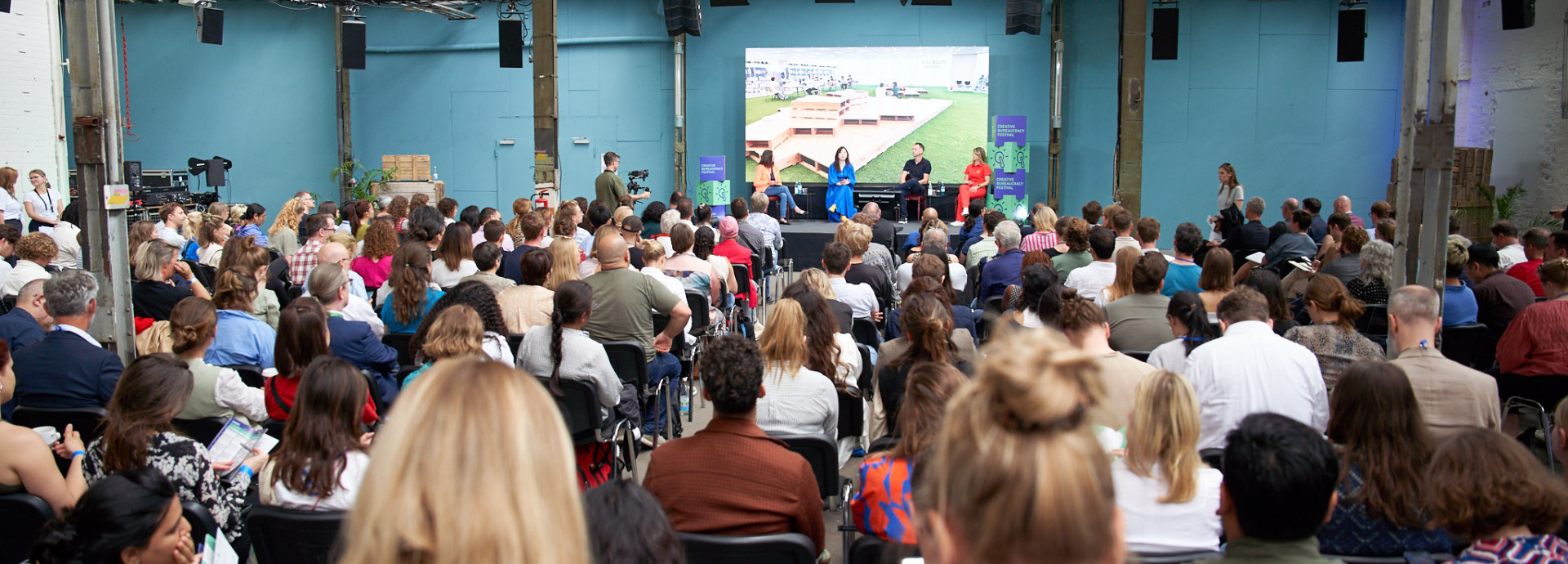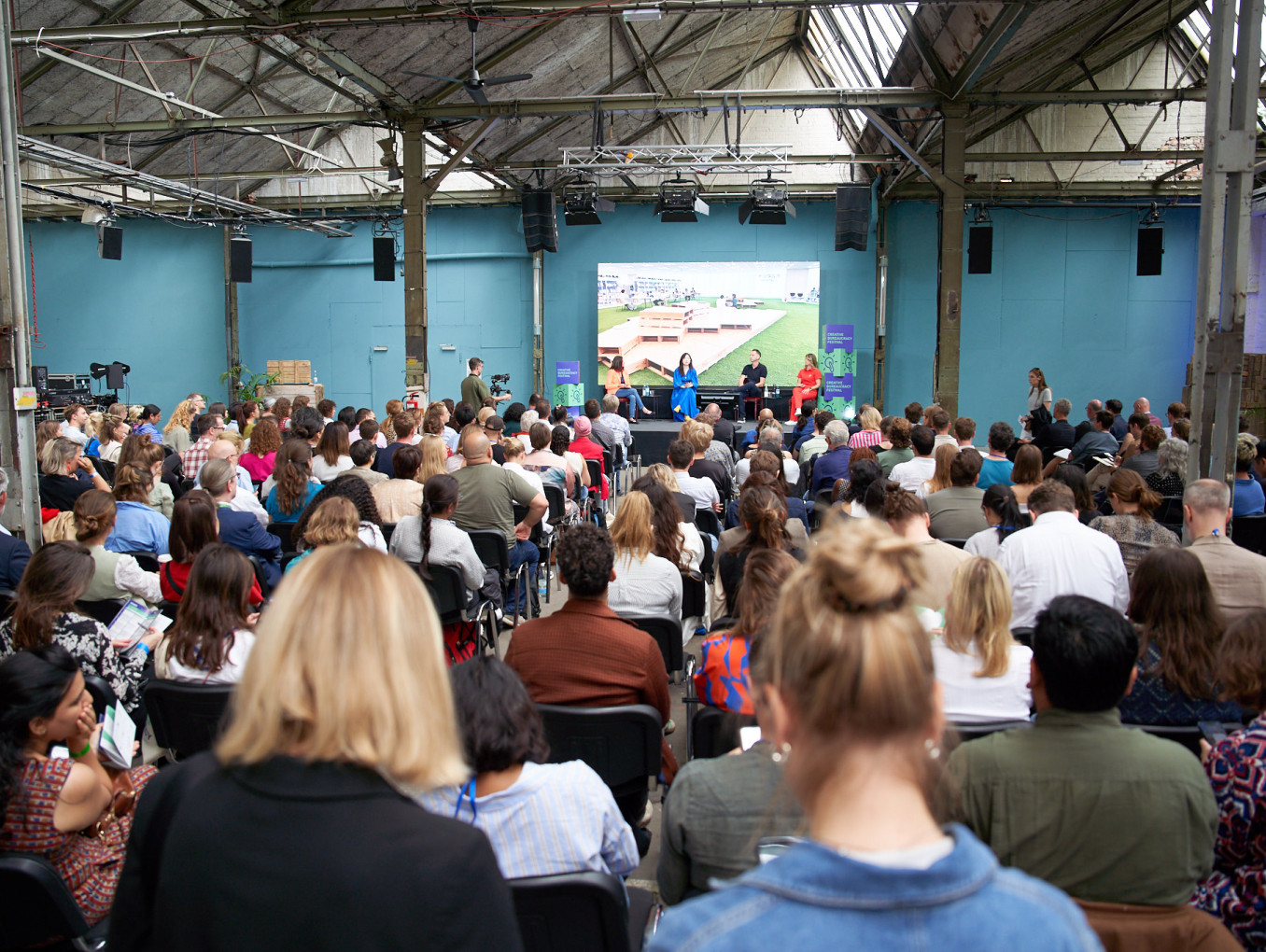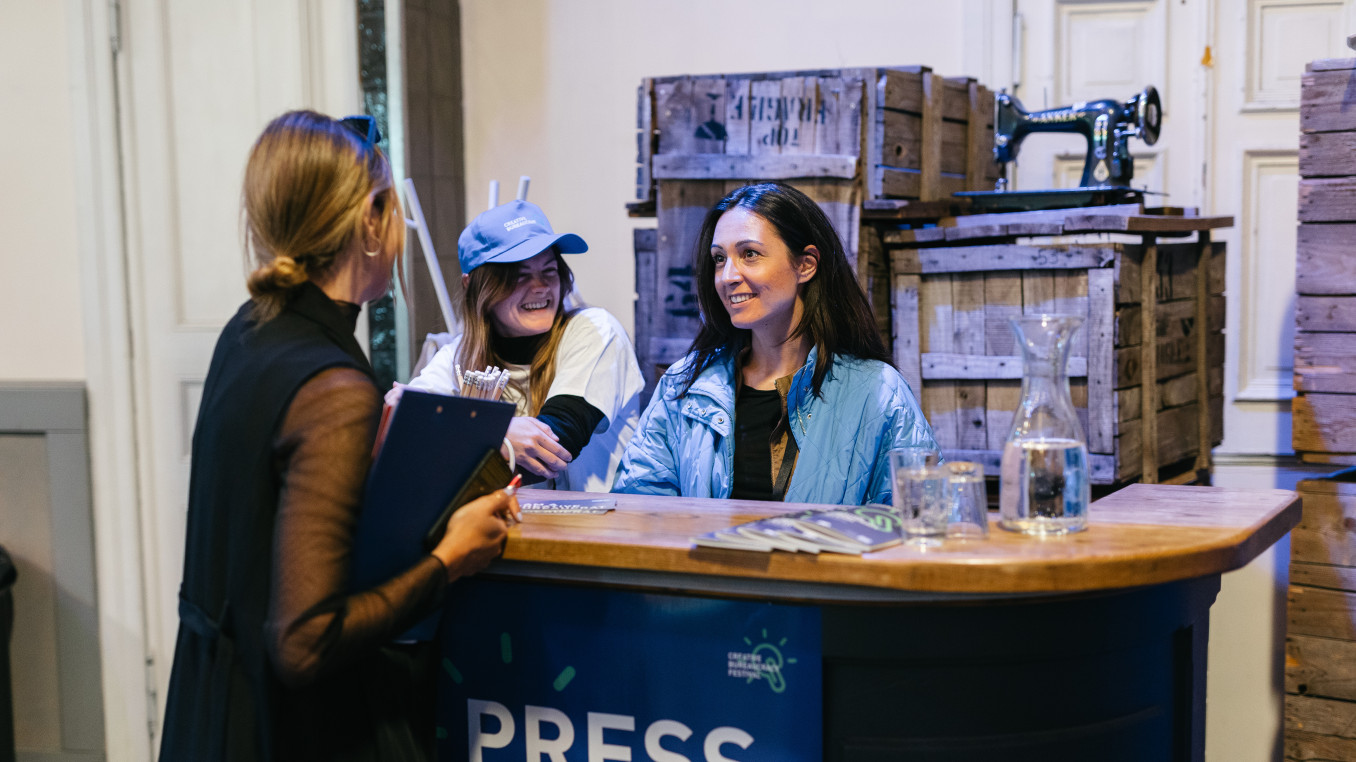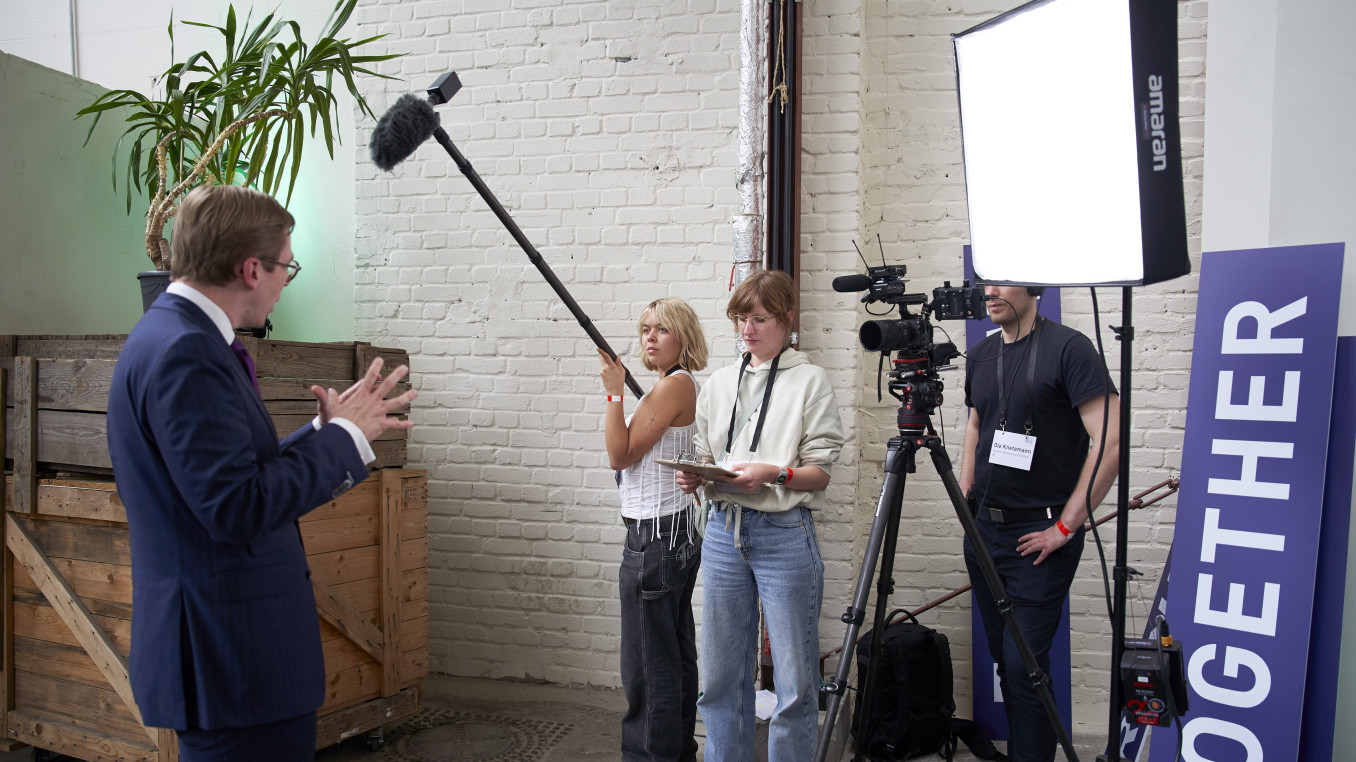

Record Attendance and New Impetus for State Modernisation at the 8th Creative Bureaucracy
- The 8th Creative Bureaucracy Festival took place on 5 June 2025.
- With over 2,100 attendees on site and more than 2,000 viewers via livestream, the festival recorded the highest participation numbers in its eight-year history.
- Key impulses for public sector innovation and state modernisation came from Philipp Amthor, Katja Wilken, Thomas de Maizière, and representatives from the Federal Ministry for Digital and State Modernisation, among others.
- A recording of the programme on the Impact Stage is available here: https://www.youtube.com/@creativebureaucracyfestiva1764/playlists.
- Press photos are available here: https://creativebureaucracy.org/press.
- The 9th Creative Bureaucracy Festival will take place on 11 June 2026.
Berlin, 18 June 2025. The 8th Creative Bureaucracy Festival took place on 5 June 2025 at Festsaal Kreuzberg and set a new attendance record with over 2,100 participants on-site and more than 2,000 viewers via livestream. Johanna Sieben, Festival Director and Deputy Managing Director of the Falling Walls Foundation, sees the high level of interest as a promising signal for the potential to reshape government: “More than ever, people working in public administration are seeking exchange and inspiration, because the debate around state modernisation is no longer a ‘nice to have’. The strong attendance is an encouraging sign that committed changemakers are actively driving and will continue to drive the cultural transformation of bureaucracy.”
With a diverse programme addressing fundamental rethinking of the state, urban transformation, climate justice, and digitalisation, and with speakers from over 30 countries, the Creative Bureaucracy Festival provided a platform for a wide range of perspectives.
Projects and Impulses from Over 30 Countries
The wide range of national and international speakers highlighted the growing urgency of state modernisation on a global scale. Two key figures in today’s bureaucracy debate took the stage at the festival: Philipp Amthor, Parliamentary State Secretary at the Federal Ministry for Digital and State Modernisation, and former Federal Minister Thomas de Maizière, representing the Initiative for a State Capable of Acting.
Philipp Amthor declared state modernisation and the reduction of bureaucracy a “top priority”, announcing plans to present a comprehensive modernisation agenda for the federal administration by the end of the year. He also emphasised a “pro-state” approach to reform, distancing himself from the idea of disruptive change.
Former Interior Minister Thomas de Maizière echoed this sentiment, warning that structural reform in public administration can no longer be delayed – but must take place “evolutionarily rather than revolutionarily”. A functioning bureaucracy, he stated, “is what distinguishes a democracy from a dictatorship.”
Contributions by Martina Klement, Chief Digital Officer and State Secretary at the Berlin Senate Chancellery, Member of Parliament Ralph Brinkhaus, Simone Schwanitz, Secretary General of the Max Planck Society, Dörte Dinger, Head of the Office of the Federal President, Katja Wilken, President of the Federal Office of Administration, and many other representatives from federal, state, and municipal government sketched out solutions and concrete projects for a more efficient, human-centred, and accessible public administration of the future.
International contributions included James Anderson from Bloomberg Philanthropiesand Graça Fonseca, former Minister of Culture of Portugal and co-founder of the Futura Foundation. Their inputs illustrated how cities can help address global challenges and strengthen democratic processes. In a panel discussion, Cori Zarek from the Apolitical Foundation and Tamara Srzentić, former Minister for Public Administration and Digital Transformation in Montenegro, explored creative alternatives to radical cuts in bureaucracy.
Among the more than 200 speakers were also Dirk Günnewig, State Secretary at the Ministry of Finance of North Rhine-Westphalia, Omezzine Khélifa, former advisor to the Tunisian Ministry of Finance, Fedor Rose, Head of the State Chancellery of Rhineland-Palatinate, and Julius Ibel, Head of the Federal Chancellery’s Data Lab.
Theresa Twachtmann, Managing Director of PD – Berater der öffentlichen Hand, the Festival’s main partner, said: “I was truly impressed by the diversity of ideas and approaches for how public administration can succeed – modern, committed, and creatively shaped. So many people came to Berlin, embracing the festival spirit while engaging in a meaningful and forward-looking discussion about how an effective public sector supports a thriving democracy. It was a pleasure to witness this space of exchange and dialogue. My thanks go to everyone who made it possible!”
Claus Wechselmann, Managing Director at PD, adds: “Once again this year, the Creative Bureaucracy Festival brought together leaders and staff from across public administration, students, and everyone interested in better government. That’s why we’re proud to support the festival for the sixth year running as a main partner. And that’s why I’m especially pleased that we were able to present promising projects and fresh approaches to modern public administration alongside some 40 representatives from the public sector. This kind of exchange is incredibly valuable – these projects inspire courage and imitation. The festival is the right place for that.”
The wide range of partnerships with further leading organisations underscores the Creative Bureaucracy Festival’s commitment to addressing one of society’s most pressing challenges. In addition to its main partners – the Falling Walls Foundation and PD – Berater der öffentlichen Hand – the Festival is supported and enriched by numerous institutions, including:
the Institute for Federal Real Estate (BImA), the Federal Chancellery, the Federal Office of Administration, the Federal Ministry of Labour and Social Affairs, the Federal Ministry of Research, Technology and Space, the Federal Ministry for Family Affairs, Senior Citizens, Women and Youth, the Federal Ministry of Defence, byte – the Bavarian Agency for Digital Affairs, the Digital Service of the Federal Government, the European Commission, the Deutsche Gesellschaft für Internationale Zusammenarbeit (GIZ) GmbH, GPM – the German Association for Project Management, the Goethe-Institut, the Berlin University of Applied Sciences for Engineering and Economics, the Hertie Foundation, the Konrad-Adenauer-Stiftung, the Max Planck Society, the Berlin Senate Chancellery, the City of Stuttgart, and the German Environment Agency.
Press Contact:
Felix Mihalek, PR Manager Creative Bureaucracy Festival, +49 30 60 98 83 97 80, press@creativebureaucracy.org
ABOUT THE CREATIVE BUREAUCRACY FESTIVAL
The Creative Bureaucracy Festival shines a spotlight on creative solutions to a wide variety of community issues within administration, bringing them center-stage and fostering a dialogue among the individuals and minds behind them. According to its president Charles Landry, the festival stands for a change from a "No, because" culture to a "Yes, if" culture that inspires people to try new things. The festival also aims to strengthen the reputation of the administration and appeal to imaginative young talents. creativebureaucracy.org
ABOUT THE FALLING WALLS FOUNDATION
Since 2009, the non-profit Falling Walls Foundation has been bringing together the most renowned and influential thought leaders from around the world. Nobel Prize winners, start-ups, young scientific talents, research companies, culture, politics and the media discuss the question: "Which are the next walls to fall in science and society?". The Falling Walls Foundation's programmes build bridges be-tween science and society and convey enthusiasm for the work of scientists in all disciplines.falling-walls.com
ABOUT PD – ADVISOR TO THE PUBLIC SECTOR
As a partner to the public sector, PD combines economic and strategic expertise with in-depth knowledge of the special processes and structures of public sector clients. On this basis, PD offers consulting and management services on all aspects of modern administration with a team of around 1,100 employees. Clients are exclusively federal, state and local authorities as well as other public bodies and institutions, as PD is itself 100 per cent publicly owned as an in-house consultancy. pd-g.de

